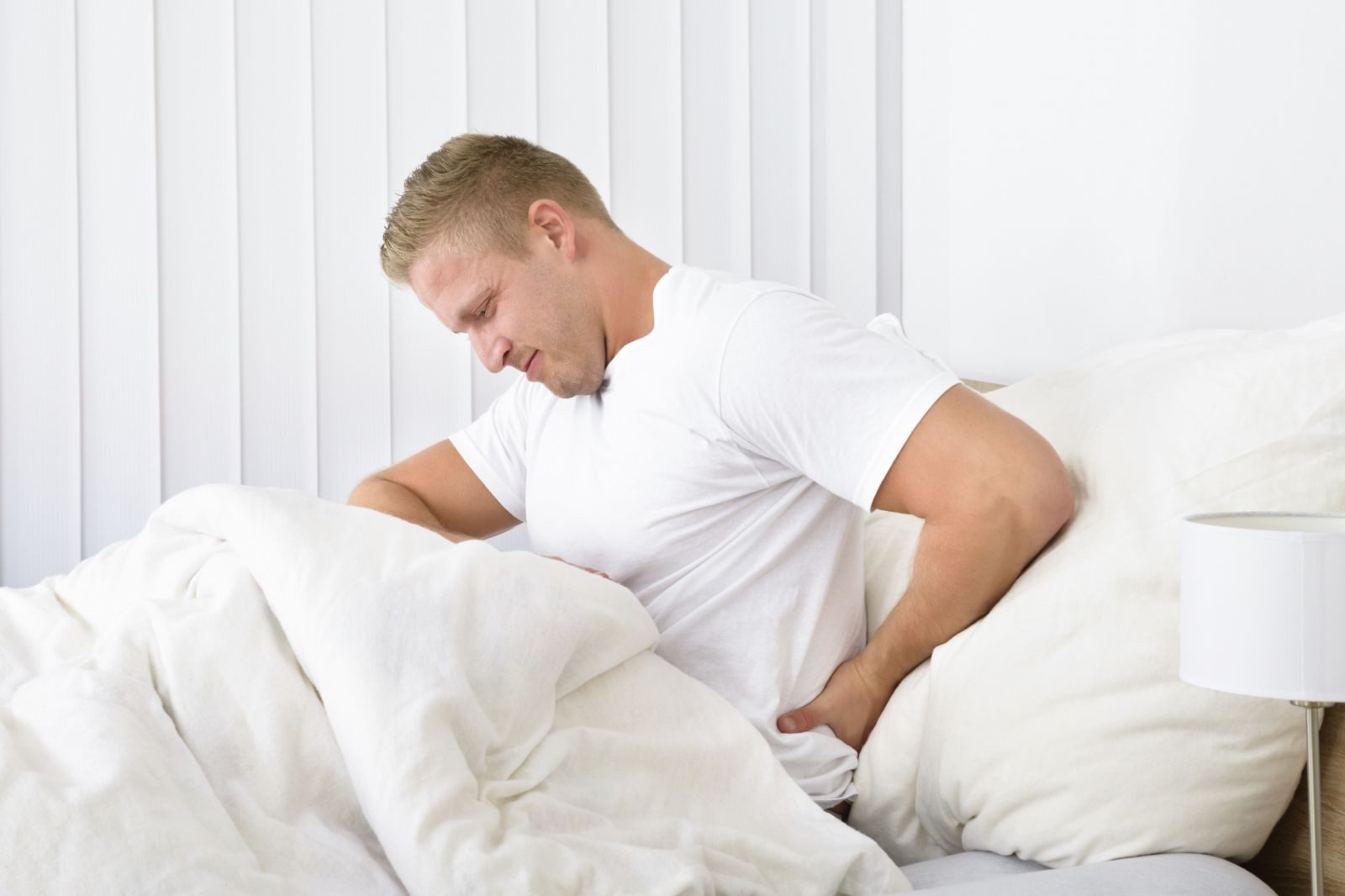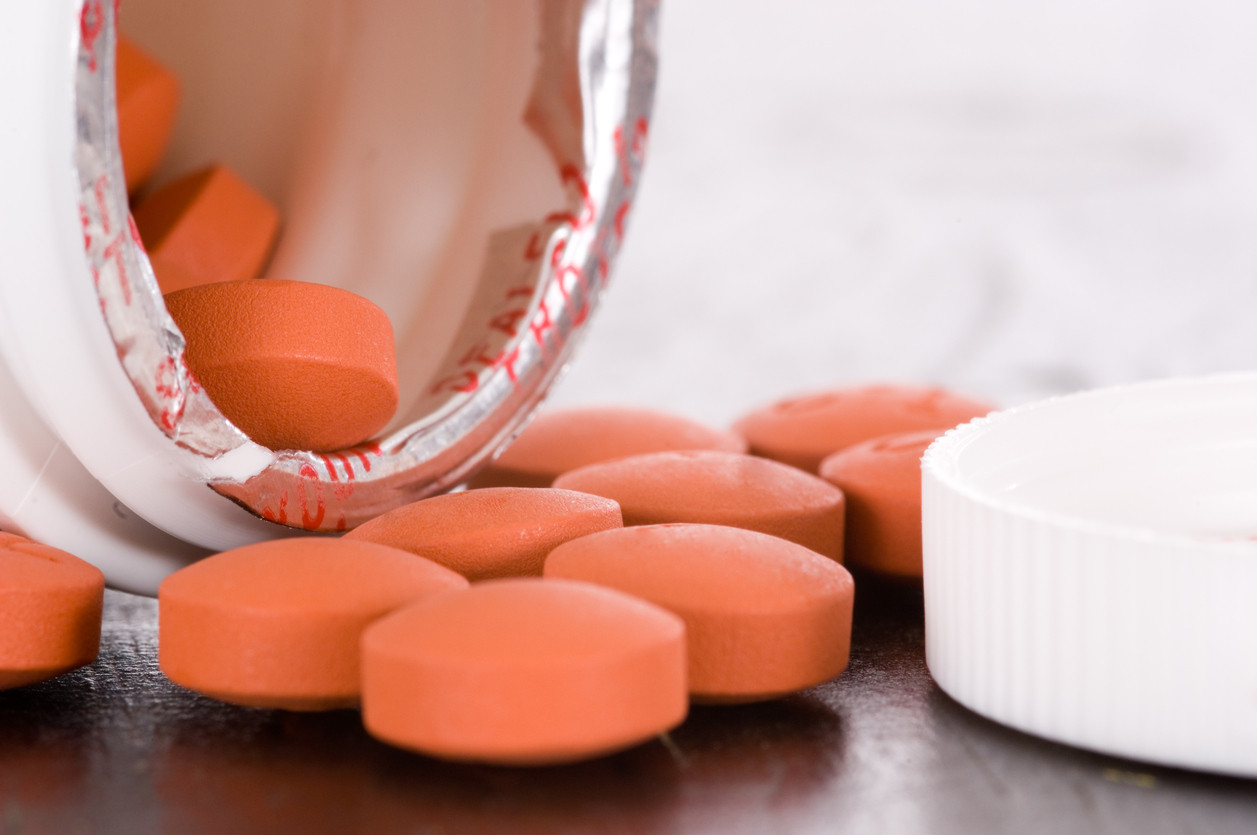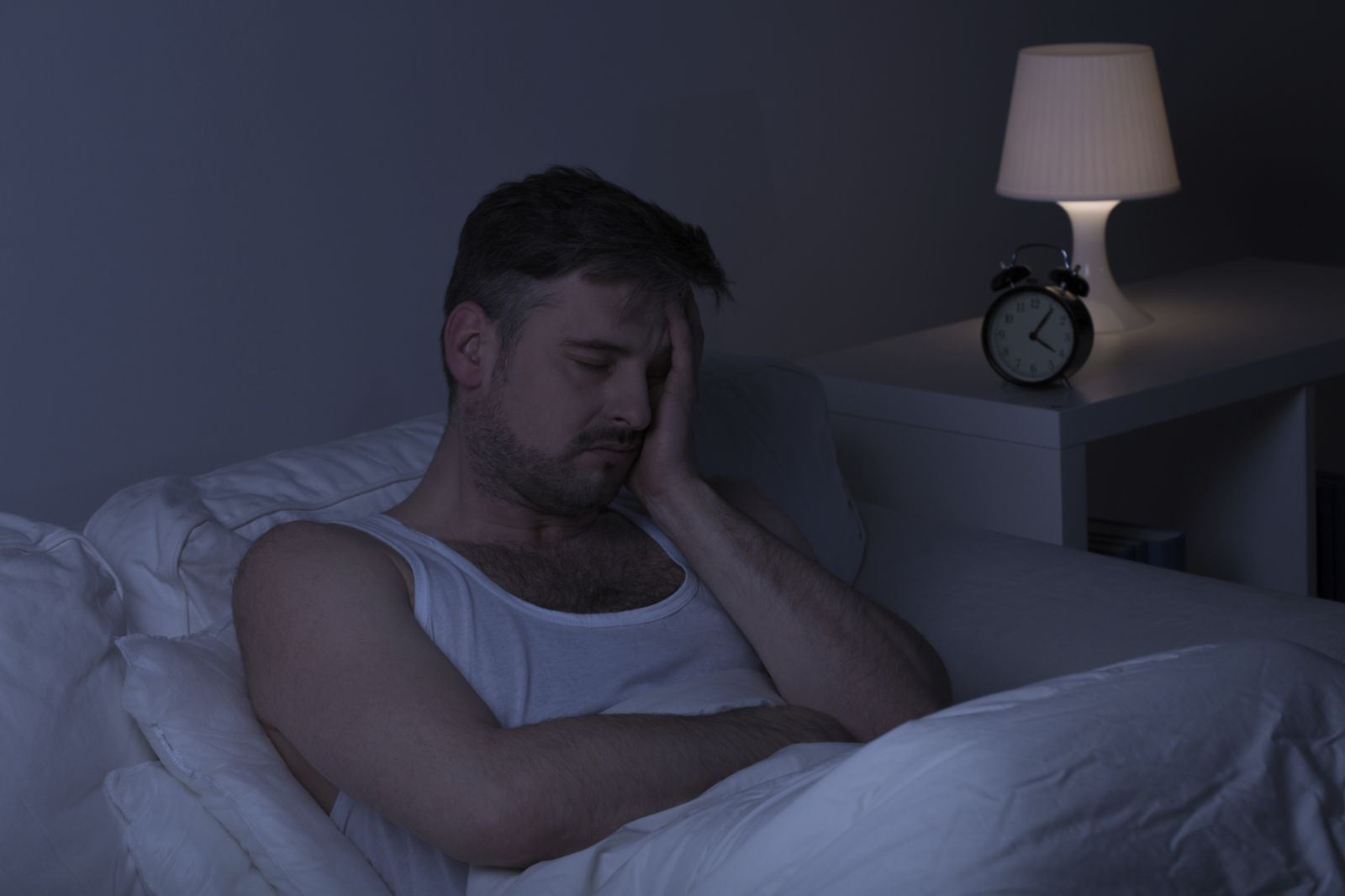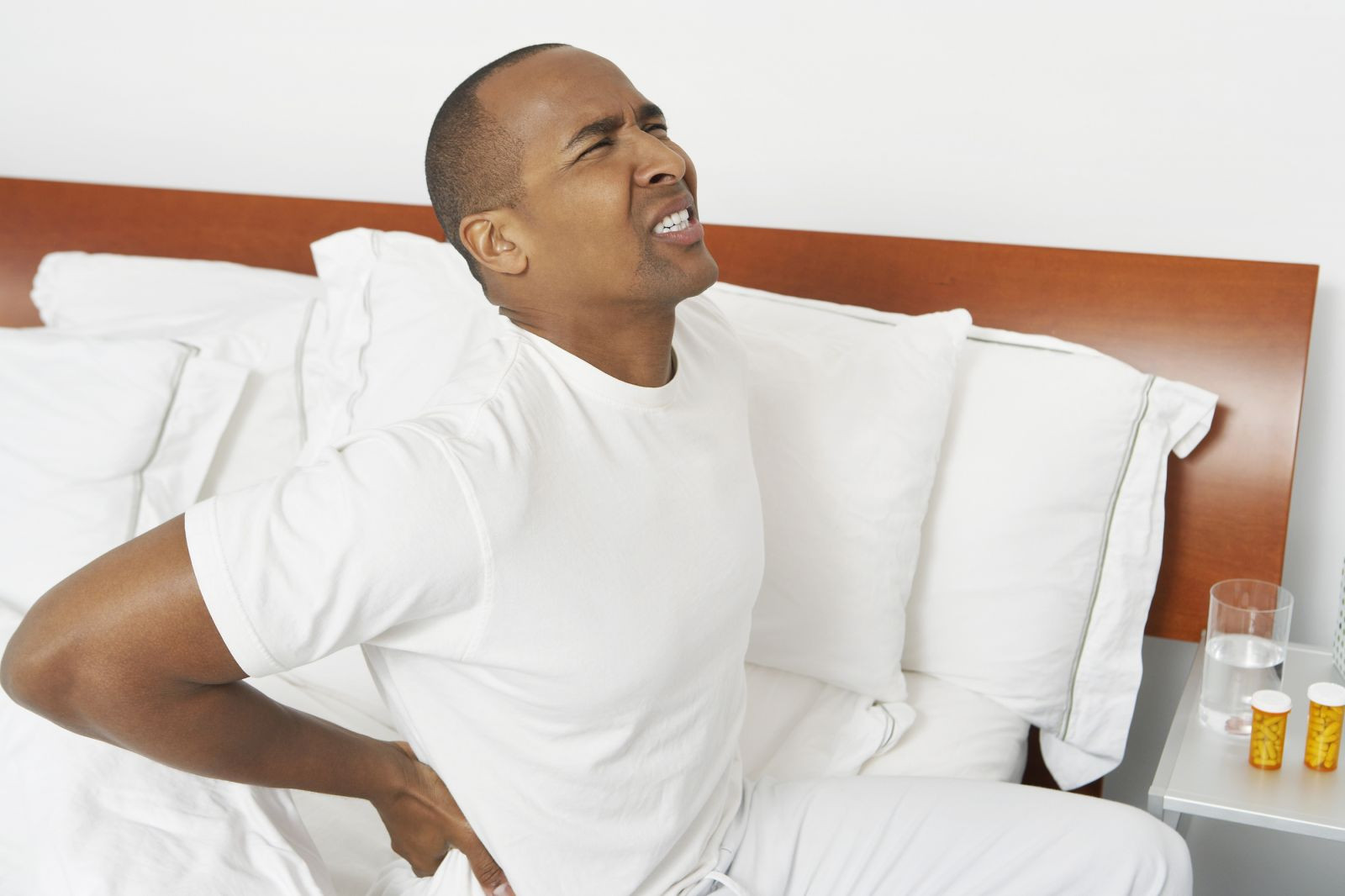
Wildfires: How to cope when smoke affects air quality and health

What can magnesium do for you and how much do you need?

Dry socket: Preventing and treating a painful condition that can occur after tooth extraction

What happens during sleep �� and how to improve it

How is metastatic prostate cancer detected and treated in men over 70?

Could biofeedback help your migraines?

What is autism spectrum disorder?

Plantar warts: Options for treating this common foot condition

Cancer survivorship: What comes next after treatment

Nutritional yeast: Does this savory, vegan seasoning pack a nutritional punch?
Pain Archive
Articles
Emergencies and First Aid - Back Injuries
Unless the person is able to tell you to the contrary, assume that anyone with a back injury also has a neck injury.
Place a board, such as a door or table leaf, next to the person. The board should extend below the buttocks (ideally to the feet) and above the head. Keeping the head aligned with the rest of the body, gently logroll the person toward you. Move the board under the person and ease him or her onto it. If the person is vomiting, lay him or her on one side and continue to support the head.
Bed rest for back pain? A little bit will do you.
Bed rest, once a key part of treating back pain, has a limited role in healing sore backs. In very small doses, bed rest can give you a break when standing or sitting causes severe pain. Too much may make back pain worse. Here is how to do bed rest "right."
To get the most from staying in bed, limit the time you are lying down to a few hours at a stretch, and for no longer than a day or two. You can rest on a bed or sofa, in any comfortable position. To ease the strain on your back, try putting pillows under your head and between your knees when lying on your side, under your knees when lying on your back, or under your hips when lying on your stomach. These positions reduce forces that sitting or standing impose on the back �� especially on the discs, ligaments, and muscles.
Are painkillers also killing your hearing?
| Image: iStock |
When you think of risk factors for hearing loss, over-the-counter pain relievers probably aren't among them. But a Harvard study published in the American Journal of Epidemiology suggests that frequent use of ibuprofen (Advil, Motrin) or acetaminophen (Tylenol) may be an important contributor. In the study, women who took the pain relievers at least twice a week were more likely to experience hearing loss, and more frequent usage increased the risk by up to 24%. The findings are similar to a study of men and hearing loss, although aspirin was also found to contribute to risk in that study.
Researchers speculate that the pain relievers may be damaging the cochlea, the snail-shaped hearing mechanism in your inner ear. "Ibuprofen can reduce blood flow to the cochlea, which could result in cellular damage and cell death. Acetaminophen may deplete the antioxidant glutathione, which protects the cochlea from damage," says study author Dr. Sharon Curhan, instructor in medicine at Harvard Medical School.
Does this mean you should think twice before popping a pill for headache or back pain? These medicines do provide good pain relief for many people. "However, frequent use of these medications and use over long periods of time may increase the risk of hearing loss and may cause other adverse health effects. Therefore, it is important to take these medications mindfully and to limit their use as much as possible," says Dr. Curhan. As always, talk to your doctor before making any changes in your medication use.
To learn more about the things that can threaten your hearing, and what you can to do keep this sense sharp and clear, buy , a Special Health Report from Harvard Medical School.
How does the new vaginal product alleviate pain during intercourse?
Intrarosa, a vaginal insert containing dehydroepiandosterone (DHEA), improves vaginal lubrication to alleviate pain during intercourse.
The healing power of touch
Massage therapy can help relieve pain, speed recovery from injury or surgery, and reduce stress.
Image: Jacob Wackerhausen /Thinkstock
Men may think of massage as an occasional treat or a vacation indulgence, but this type of therapy could be a natural way to stay healthy and pain-free.
One of the most common health issues for older men is chronic pain, defined as pain that lasts more than 12 weeks. This includes back pain, headache, cancer pain, and arthritis pain. Then there are the everyday aches from daily living. All of these act as barriers to a healthy lifestyle.
Body scan mindfulness exercise for pain
Stress reduction expert Jon Kabat-Zinn recommends the body scan mindfulness exercise as the best form of mindfulness meditation for pain conditions.
He advises practicing it every day for 45 minutes, even if it seems boring or doesn't seem to be helping. "You don't have to like it, you just have to do it," he explains in his book. "Whether you find the body scan to be very relaxing and interesting or difficult and uncomfortable or exasperating is irrelevant to whether it will serve you well." The goal of the body scan is not to relieve the pain completely, but to get to know it and learn from it so you can manage it.
How to sleep well despite chronic pain
Chronic pain and insomnia are an unhealthy combination. According to the National Sleep Foundation, chronic pain disturbs the slumber of one in five Americans at least a few nights a week. Whether it's from a bad back, arthritis, or headaches, chronic pain puts you in double jeopardy: the pain robs you of restful sleep and makes you more fatigued, and thus more sensitive to pain.
But you can start to break this vicious cycle.
What makes my joints stiff in the morning?
Morning stiffness like in the back, knees, and feet are common complaints for many older adults. People cannot reverse the affects of joint aging, but they can reduce the severity and frequency of morning stiffness by being more active and adopting regular exercise to increase muscular strength and flexibility.
Can the right shoes relieve knee pain?
It appears that “unloading” shoes are no better at reducing pain or improving function than a good pair of walking shoes, according to a study published online July 12, 2016, by Annals of Internal Medicine.

Wildfires: How to cope when smoke affects air quality and health

What can magnesium do for you and how much do you need?

Dry socket: Preventing and treating a painful condition that can occur after tooth extraction

What happens during sleep �� and how to improve it

How is metastatic prostate cancer detected and treated in men over 70?

Could biofeedback help your migraines?

What is autism spectrum disorder?

Plantar warts: Options for treating this common foot condition

Cancer survivorship: What comes next after treatment

Nutritional yeast: Does this savory, vegan seasoning pack a nutritional punch?
Free Healthbeat Signup
Get the latest in health news delivered to your inbox!
Sign Up










